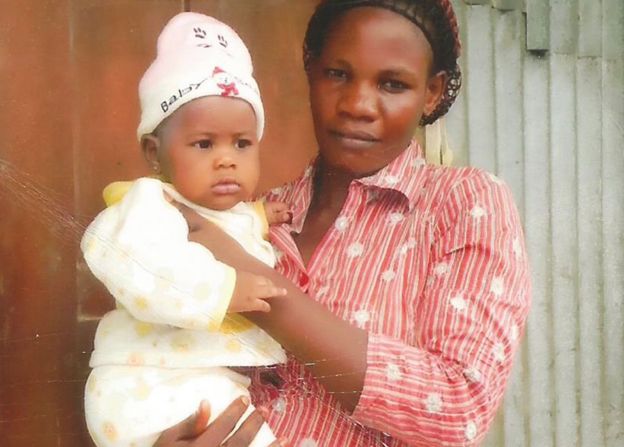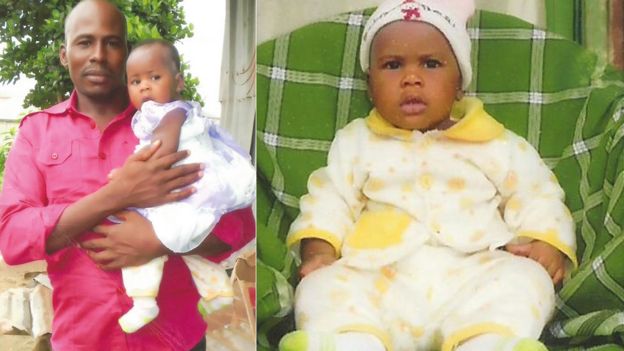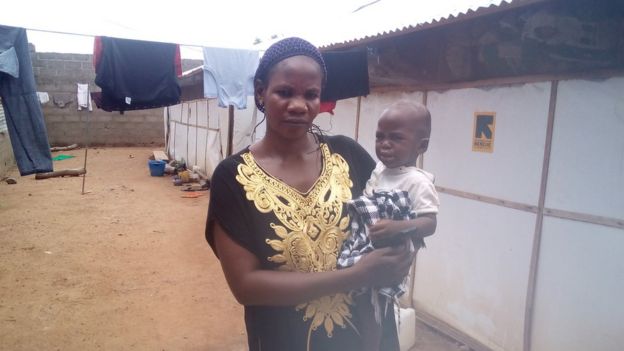By Adaobi Tricia Nwaubani
In our series of letters by African journalists, Nigerian novelist and writer Adaobi Tricia Nwaubani looks a mother’s desperate battle to recover her kidnapped toddler.
For many victims of the Boko Haram insurgency in north-eastern Nigeria, the tragedy never seems to end. It simply takes on new dimensions.
Take the case of 32-year-old Maria David Zaya, whose two-year-old daughter, Precious, was kidnapped by militants of the Islamist group in September 2014, while she was visiting her in-laws in Madagali in Adamawa state.
Precious was taken captive along with six other children and two women who lived in the same neighbourhood.
Two weeks later, one of the women escaped.
She told Mrs Zaya that Precious had been quite favoured in captivity because of her light skin and pretty face, and given to one of the wives of an “amir”, a Boko Haram commander, who did not have any children of her own.

Distressed about the thought of not seeing her daughter ever again, Mrs Zaya returned to Port Harcourt, in the southern state of Rivers, where her husband, David, works as a security man.
Shortly after, she gave birth to her second child, a boy named Emma.
Seven months after she returned, Mrs Zaya received some unexpected good news: the Nigerian military had rescued a number of Boko Haram captives from the Sambisa forest, and taken them to the Malkohi camp for displaced people in Yola, the main city in Adamawa.
“One of my neighbours in the village saw my daughter and some of the other six missing children there and called me to come quickly,” said Mrs Zaya.
But by the time she arrived, Precious had disappeared.
‘I recognised her’
After three months of shuttling between various government, military and NGO offices, with the assistance of a Red Cross official, Mrs Zaya finally located her daughter at the Nigerian Defence Academy in Kaduna, where legitimate wives of Boko Haram members (not those forcefully married) were being held with their children for a debriefing process.
“When I saw Precious, she was wearing a headscarf but I recognised her,” Mrs Zaya said.
“She continued following me and staring at me.”
More on Boko Haram crisis
Mrs Zaya soon learned that the girl she believed to be Precious had a new name, Yagana, and was in the custody of a Boko Haram wife called Asabe.
She said Asabe became furious when Mrs Zaya presented herself as the girl’s mother, insisting that Yagana was her younger sister.
Following the ensuing fracas, the military officials asked Mrs Zaya to return with her husband and with any other proof she might have of the child’s parentage.
A month later, in September 2015, the couple came with photos of Precious and the girl’s birth certificate, but they were denied access to the camp because of an unauthorised official was accompanying them.

It was not until December that Mrs Zaya was assigned another authorised Red Cross official to accompany her back to Kaduna.
However, by then, the residents of the defence academy refugee camp had been released.
After months of frantic searching and desperate letters to relevant authorities, Mrs Zaya finally located Asabe in a remote village in Damboa in Borno state, where the woman had taken the disputed child.
“This kind of situation is not common but it is also not a new thing,” said Jethro Zarma of the State Investigative Bureau in Yola, one of the officers now handling the case.
Based on police records, he said, there have been other incidents of more than one parent claiming a child rescued from Boko Haram captivity.
When several attempts to get Asabe to turn up at the police station with the child failed, Mr Zarma said the department eventually sought the assistance of the military, which then sent soldiers into a volatile area of Damboa to escort the disputed child to a police station in Maiduguri, Borno’s main city, last month.
But Asabe did not come along.
The child, now almost five, was instead accompanied by an elderly couple, who presented themselves as the girl’s grandparents.
A confrontation ensued between the couple and Mrs Zaya.
“They became so violent and caused a lot of confusion at the police station,” Mr Zarma said.
Living in a tent
In the end, the child was taken into the custody of the Borno state government, where she has remained for the past three weeks.

“We will keep her here for her safety, pending confirmation of the child’s identity,” said Ladi Clarke, an official of the state’s social welfare office.
“The effort can only be made by Maria because she is the complainant,” she added.
Mrs Zaya is now working towards hiring a lawyer to convince a court to order a DNA test.
Until then, while her husband awaits his family’s return to their home in Port Harcourt, Mrs Zaya lives with one-year-old Emma in a tent within the premises of the St Theresa’s Catholic Church in Yola, which has been converted into a camp for persons displaced by the Boko Haram insurgency.
“I will not go back to Port Harcourt until I finish everything,” she said.
“I will wait until I get my baby.”
It is frightening to imagine the number of children rescued from Boko Haram who may have ended up in the custody of opportunistic strangers.
————————
Op–ed pieces and contributions are the opinions of the writers only and do not represent the opinions of Y!/YNaija
Originally published the BBC


Leave a reply